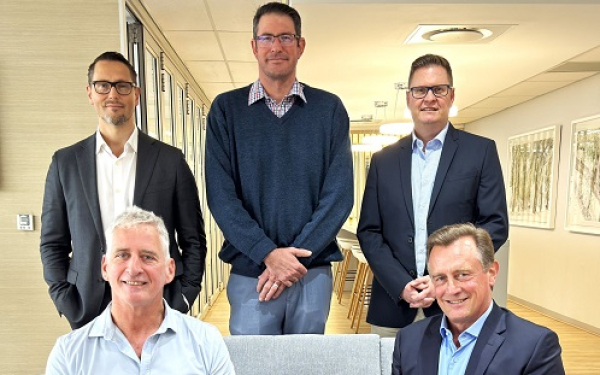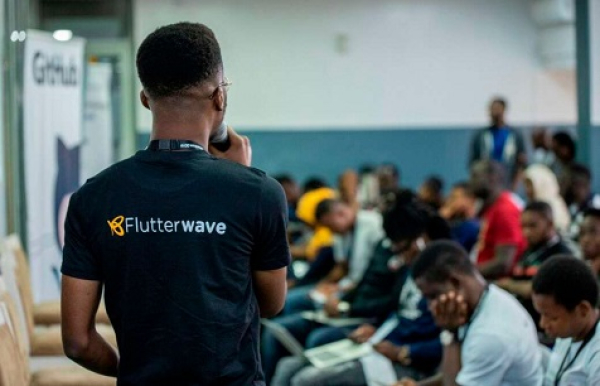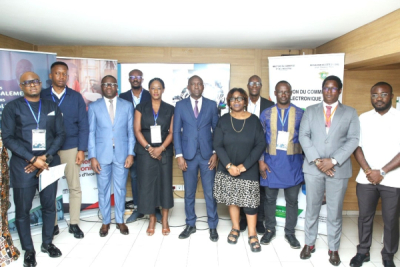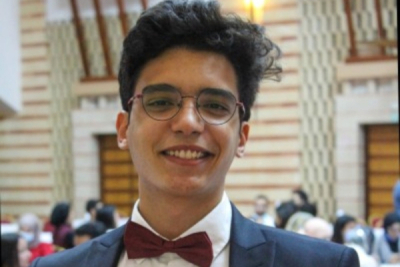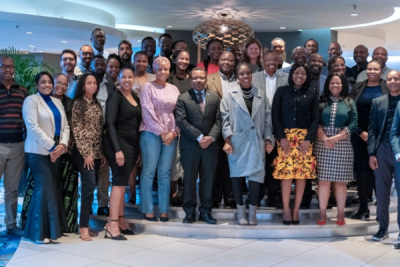Omnisient, a South African startup focused on privacy-preserving data collaboration, has raised $7.5 million in Series A funding from Arise, an investor in African financial service providers and fintechs. The startup announced the funding on August 27.
The investment will fuel Omnisient’s expansion into markets in Africa, the UK, the US and the Middle East. It will also allow Omnisient to partner with larger data providers, expanding financial services access globally.
Flutterwave has secured a Payment Systems Operator (PSO) license from the Bank of Uganda, enabling it to offer its payment solutions to businesses in the east-african country. The company announced this new move on August 28.
Ki kati Uganda, we have brought the wave to you! 🇺🇬🦋
— Flutterwave (@theflutterwave) August 28, 2024
We have secured a Payment Systems Operator license from the Bank of Uganda!
Expanding into Uganda aligns with our vision of a financially connected Africa where enterprises can operate seamlessly on the continent and expand… pic.twitter.com/4WKblu1GkA
This milestone allows Ugandan businesses to accept various payment methods, including mobile money, bank transfers and cards, while also facilitating easy remittances from the diaspora.
The expansion allows businesses to boost growth and efficiency by capitalizing on Flutterwave’s solutions, including payment collection, seamless payouts and invoicing.
He's dedicated to helping children with Attention Deficit Hyperactivity Disorder (ADHD) thrive. He provides virtual reality tools to assist therapists in their work.
Ahmad Al-Kabbany is an Egyptian computer scientist and entrepreneur, and the founder and CEO of VRapeutic, a startup specializing in the development of therapeutic and rehabilitation solutions through innovative software.
Founded in 2017, VRapeutic harnesses the power of virtual reality (VR) to create therapeutic experiences. The company integrates biofeedback and artificial intelligence into its solutions, aiming to enhance the quality of therapy sessions for children with autism and Attention Deficit Hyperactivity Disorder (ADHD).
VRapeutic allows therapists to deliver personalized content through supervised sessions while monitoring the impact of the therapy program through both short- and long-term progress of the children. The content developed by the startup is based on scientific data and is provided under the supervision of experienced doctors and therapists.
The startup is a former participant in the Flat6Labs Cairo accelerator and the Invest Ottawa pre-acceleration program. Since 2020, it has been part of UNICEF's Innovation Fund portfolio.
In addition to leading VRapeutic, Ahmad Al-Kabbany is a founding member of the Intelligent Systems Lab, established in 2018. This lab focuses on research in intelligent and autonomous systems, image and video processing, computer vision, image synthesis, immersive technologies, signal analysis, and data science.
He is also a founding member of the Multimedia Interaction and Communication Lab, launched in 2024. This lab explores new ways to encode signals and improve human-computer and media interactions.
Ahmad Al-Kabbany holds a master's degree in Electrical, Electronics, and Communications Engineering, obtained in 2008 from the Arab Academy for Science, Technology and Maritime Transport in Egypt. He also earned a Ph.D. in Electrical and Computer Engineering in 2016 from the University of Ottawa, Canada.
Melchior Koba
E-commerce in Côte d'Ivoire has seen a surge in recent years, with a marked increase in online retail sites and sales volume.
Key players in Côte d'Ivoire's e-commerce sector gathered in Abidjan on Wednesday and Thursday to discuss the future of the industry. The market, valued at over XOF280 billion (€421.6 million) in 2023, is expected to see a compound annual growth rate of 11.3% through 2027, according to figures presented at the strategic workshop.
The workshop, initiated by the Ministry of Commerce and Industry in collaboration with the consulting firm Marabu, focused on promoting a national strategic vision for e-commerce development. The goal is to cultivate a competitive, inclusive, and sustainable digital ecosystem.
"We aim to position Côte d'Ivoire as a regional hub in this rapidly expanding sector. We are here to collaborate, exchange ideas, and develop initiatives that will foster a competitive, inclusive, and sustainable digital ecosystem," stated Sylla Kalilou, Director General of External Trade, who represented Minister of Commerce and Industry Souleymane Diarrassouba.
Like many African nations, consumers in Côte d'Ivoire are increasingly attracted to online shopping, driven by both local and international e-commerce platforms like Jumia, Afrimarket, and Africashop, which provide a diverse array of products and services. However, despite this rapid growth, the Ivorian e-commerce market remains largely underdeveloped, with many startups facing challenges in establishing themselves.
Through this initiative, the government aims to facilitate dialogue among stakeholders in the sector to enhance e-commerce in Côte d'Ivoire. The initiative also seeks to communicate ongoing reforms, which include drafting and validating a new e-commerce law, implementing a national e-commerce strategy, creating a strategic action plan through 2028, and developing regulations for a public-private consultation framework.
Samira Njoya
A technology enthusiast with extensive experience in embedded systems and robotics, he has developed an open-source platform dedicated to building robots.
Kayoum Djedidi, a Tunisian electronics engineer and entrepreneur, is the co-founder and CEO of Open Organic Robotics (OORB), a startup that aims to make it easier for people to create robots.
Founded in 2023, OORB provides a suite of tools to help users build robots from start to finish, including the OORB platform, the OORB Robodog educational kit, and a dedicated community.
The OORB platform is an open-source robotics development framework that features an intuitive graphical interface, supports multilingual programming, and includes a CAD tool for editing modular parts. With AI and a chatbot, users can generate code, components, and services.
The OORB Robodog educational kit is an open-source, 3D-printed robot designed to introduce users to the OORB platform. The OORB community brings together enthusiasts around open-source principles and offers 3D printing services and paid robotics projects.
In addition to his role at OORB, Djedidi is an Edge MLOps engineer at Ubotica Technologies and a research intern at the National Engineering School of Sousse. He holds a bachelor's degree in embedded systems from the Higher School of Science and Technology of Hammam Sousse.
Djedidi's professional career began in 2018 at Tekaya Travel Holiday, a Tunisian travel agency. He has also worked at Kaza Trade, a wholesale company, and ARSELA Technologies, a no-code automation service provider. From March 2022 to March 2024, he worked as an embedded systems and Python instructor at GOMYCODE, a startup focused on digital skills training.
Melchior Koba
To advance information and communication technologies, the International Telecommunication Union is forming strategic partnerships
The University of the Witwatersrand (Wits) announced on Monday a partnership with the International Telecommunication Union (ITU) to accelerate digital skills development among policymakers and ICT professionals across Africa.
As part of the collaboration, Wits’ LINK Centre will join the ITU Academy’s network of training centers.
“This significant milestone will complement the postgraduate degree programs and the professional certificates offered by the LINK Centre. The Centre is poised to contribute substantially to the critical skills required for the economic and social advancement of South Africa and beyond, promoting a globally connected and digitally proficient society,” Wits said in a statement.
The ITU established its academy in 2012 to meet the growing demand for training, education, and research in the ICT sector. Over the years, various entities have joined the program, benefiting from the specialized knowledge and tools provided by the UN agency to navigate the rapidly evolving digital ecosystem.
Wits is one of the top universities in South Africa and the continent. According to the 2023 QS Ranking, it ranks as the second-best university in Africa, behind the University of Cape Town and Stellenbosch University.
Adoni Conrad Quenum
She wants to make learning more engaging for students by teaching them in their native languages from kindergarten to high school. To do this, she created a technology platform that helps students learn in their mother tongue.
Mukundi Lambani (photo) is a South African entrepreneur and the founder and CEO of Ambani Africa, an educational technology company dedicated to promoting mother-tongue education for children from kindergarten through high school.
Founded in 2021, Ambani Africa provides a platform that facilitates early learning by offering digital resources that enable students to learn in African languages. The platform’s goal is to empower students to learn and communicate effectively in their native languages.
Ambani Africa’s learning experience is interactive, featuring games, videos, e-books, and lessons. The content is available in English and over 15 other languages, including isiZulu, Kiswahili, Yoruba, French, Spanish, and more.
According to Mukundi Lambani, African languages are woefully underrepresented in the digital realm, leaving young learners struggling to find educational resources in their native tongue. She emphasizes the critical importance of the early years for language development, noting that falling behind by third grade can be a significant hurdle. That's why Ambani places such emphasis on mother-tongue education during this crucial stage.
Lambani holds a bachelor’s degree in film from the African Film and Drama Academy (AFDA), earned in 2008. She also obtained a diploma in business management and administration from Varsity College in 2011. In 2017, she completed a master’s degree in communication and media studies at Bournemouth University in the UK. In 2019, she earned a certificate in intellectual property management from the University of Witwatersrand.
Lambani’s career began in 2008 at the South African Broadcasting Corporation as a video editor. In 2010, she joined the 48 Hour Film Project as a producer. By 2013, she became head of research and development at Brainbow Conscious Creatives, a creative agency. In 2017, she was appointed as a lecturer at the Academy of Sound Engineering, and in 2018, she became a project manager at the Goethe-Institut, a German cultural institute.
Melchior Koba
Launched in June 2022 by Osita Oparaugo, the Nigerian edtech GetBundi provides access to educational content in science, technology, engineering, and mathematics (STEM) and digital skills.
On Thursday, August 29, the Nigerian edtech startup GetBundi announced the signing of a memorandum of understanding (MoU) with the National Commission for Colleges of Education (NCCE). The initiative, titled "Empowering Tomorrow’s Teachers," aims to equip both students and teachers with essential digital skills.
“This initiative is not just about filling gaps in numbers but also about enhancing the quality and attractiveness of the teaching profession by equipping our future teachers with 21st-century digital skills. In today’s rapidly evolving educational landscape, our teachers must be well-versed in digital tools and technologies that enhance learning outcomes,” said Paulinus Chijioke Okwelle, Executive Secretary of the NCCE.
The program comes at a time when digital transformation is accelerating across the continent. Nigerian authorities are increasingly launching initiatives to train the population in digital skills. In August 2023, the government partnered with American tech giant Google, which plans to invest $1.5 million to train 20,000 youths in digital literacy. Later, the American Business Council (ABC) and Microsoft also committed to similar efforts.
These initiatives align with the digital agenda of President Bola Tinubu’s administration, unveiled in May 2023. Nigeria is a leading tech hub in Africa, with one of the most attractive startup ecosystems on the continent. Nigerian startups secured $469 million in 2023, representing 20.39% of the total funding raised by African startups, according to Partech Africa.
However, the country still faces significant challenges in the sector. According to the International Telecommunication Union, Nigeria ranks 26th in Africa with an ICT development index of 46.9 out of 100 in 2024, trailing far behind the top three—Libya (88.1), Morocco (86.8), and Seychelles (84.7).
Adoni Conrad Quenum
Proparco has provided a €400,000 loan to Rubyx, an African start-up, through the Bridge by Digital Africa facility. This funding will help Rubyx rapidly expand its algorithmic loan offering for start-ups and microfinance institutions across Africa.
The Bridge by Digital Africa facility, backed by Digital Africa and managed by Proparco, offers bridging finance to young African companies to support their growth between funding rounds.
This investment aims to boost access to loan products for African Very Small Enterprises (VSEs) and Small and Medium-sized Enterprises (SMEs), supporting financial inclusion efforts on the continent.
The United Nations Development Program (UNDP) and Timbuktoo Africa Innovation Foundation have launched the HealthTech Startup Accelerator Program, a Pan-African initiative focused on transforming healthcare across the continent. Hosted at the HealthTech Hub in Kigali, Rwanda, the program aims to empower startups to develop innovative health technologies that address Africa's critical healthcare challenges.
The accelerator offers early-stage startups mentorship, funding, and access to advanced resources. Applications are open to African-owned startups with founders aged 18 to 35, who have a minimum viable product in sectors like telemedicine, healthcare logistics, diagnostics, and mobile health. Interested startups must apply by October 6, 2024.
More...
He is passionate about improving education for South African students. With the startup he leads, he is committed to helping students become more independent learners, taking charge of their own education.
South African entrepreneur Kagisho Masae (photo) is the co-founder and CEO of Matric Live, an edtech startup focused on enhancing learning experiences for students. Founded in 2017 by Masae and Lesego Finger, Matric Live offers a multifunctional educational app that revolutionizes how students learn, making the process more contextual and visual. The app covers over 16 subjects, helping students prepare for their exams.
One of the app's key features is Live Exams, a simulated exam function that allows students to answer past exam questions directly on their device. It tracks the questions where students frequently give incorrect answers, enabling them to focus on and thoroughly analyze these areas.
According to the startup's website, "The platform has expanded to cover most of the high school curriculum, and the team continues to grow steadily. The aim through this platform, among other initiatives that are in the pipeline from the holding company, is to decentralize quality education."
In addition to his work with Matric Live, Masae is the founder of CynC, a digital platform connecting like-minded individuals across South Africa. He also serves as an ambassador for the charity organization One Young World and a project coordinator for the nonprofit Good Deeds Foundation.
Masae holds a certificate in financial products from Milpark Business School, earned in 2012. In 2019, he received a certificate in behavioral economics from the University of Toronto, and in 2021, he obtained a certificate in strategy execution from Harvard Business School Online.
Masae began his professional career in 2010 at Discovery Ltd, a South African financial services group, where he worked as a broker relations manager. In 2015, he joined the financial company Investec as a consultant, later holding positions as marketing and brand project manager for the wealth and investment sector.
Melchior Koba
As a super apps, MoyaApp offers a range of services, including payment processing, instant messaging, and entertainment options.
MoyaApp is a digital solution developed by the South African company Datafree Africa. Launched in 2019 by Gour Lentell, it allows users to access a variety of services through its mobile application. The super app is available on both iOS and Android platforms, where it has been downloaded over 10 million times, according to Play Store data. After downloading, users create an account to access the various services offered by the app. These services include chatting with friends, accessing live football scores, staying updated with the latest news, and making online payments.
One of the key features of MoyaApp is that users do not need mobile data to send text and voice messages. However, sending attachments requires mobile data. The startup explains this by stating that attachments require much more data than text messages, and if all media messages were free, MoyaApp would not have the capacity to keep the lights on.
Regarding other features of the super app, the startup has partnered with various companies. For instance, it has teamed up with Flash Score to provide live football scores. Access to these third-party applications requires “Prepaid Access,” which means paying for the content via MoyaApp.
"Prepaid access means that you as the user will pay for the content you want to see for how long you would like to see it. The prepaid content apps are datafree, therefore you do not need data to open Flash Score or apps that are prepaid as you only pay for the content you want to see," explains the startup.
Adoni Conrad Quenum
Artificial intelligence is becoming increasingly important in global technological advancements, including in Africa. International partnerships are being explored to foster AI growth on the continent and maximize its potential benefits.
Azerbaijan is looking to bolster its cooperation with Ethiopia in the field of artificial intelligence (AI). A high-level Azerbaijani government delegation, led by Mohammad Ali Kudaverdev, visited the Ethiopian Artificial Intelligence Institute on Wednesday, August 28, to explore potential collaborations.
The visit, reported by the Ethiopian News Agency (ENA), is part of ongoing efforts by both countries to identify areas for AI expertise exchange. It follows a similar visit by Russian officials on August 21, underscoring Ethiopia's growing interest in AI.
Ethiopia has recently accelerated its AI initiatives, focusing on sectors like healthcare and agriculture. The country passed legislation in 2023 to regulate AI and established the Ethiopian Artificial Intelligence Institute three years ago. Azerbaijan is also developing its national AI strategy.
The collaboration aims to foster knowledge sharing, develop innovative AI solutions, and capitalize on the economic opportunities offered by AI. According to PwC's "Annual Global CEO Survey," AI could contribute up to $15.7 trillion to the global economy by 2030, including $1.2 trillion in Africa, representing a 5.6% increase in the continent's GDP.
Samira Njoya
AfriLabs invites Nigerian tech innovators and entrepreneurs to an exclusive, self-funded trip to Paris from October 9th to 11th, 2024. This trip offers a chance to secure investment, gain industry insights through 500+ workshops and conferences, and participate in 33,500 business meetings.
It is also a platform to showcase Nigerian innovations on a global stage. The program is open to hubs, entrepreneurs, and key players in Nigeria's tech ecosystem.
Registration closes by September 7.


